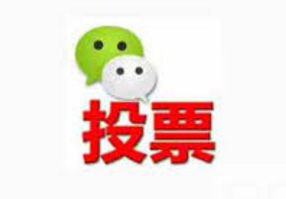Online voting for contests is nothing new. However, Wechat-based voting has become a money-making venture in China, reports the Beijing News.
й’ҲеҜ№з«һиөӣзҡ„зҪ‘дёҠжҠ•зҘЁж—©е·ІдёҚжҳҜд»Җд№Ҳж–°йІңдәӢдәҶгҖӮ然иҖҢпјҢжҚ®гҖҠж–°дә¬жҠҘгҖӢжҠҘйҒ“пјҢеҫ®дҝЎжҠ•зҘЁеңЁдёӯеӣҪе·Із»ҸжҲҗдәҶдёҖдёӘеҸ‘иҙўзҡ„жңәдјҡгҖӮ
Because WeChat is widely used across China, various contests are hosted on Tencent's social media platform.
з”ұдәҺеҫ®дҝЎеңЁдёӯеӣҪдҪҝз”Ёе№ҝжіӣпјҢжүҖд»Ҙеҗ„з§ҚжҜ”иөӣйғҪеңЁи…ҫи®Ҝзҡ„зӨҫдәӨеӘ’дҪ“е№іеҸ°дёҠиҝӣиЎҢгҖӮ
Often times participants will share a voting link with their contacts or chat groups for various contests in China which require online votes, begging for "a precious vote" for someone they know.
йҖҡеёёжғ…еҶөдёӢпјҢеҸӮдёҺиҖ…дјҡз»ҷ他们зҡ„иҒ”з»ңдәәжҲ–иҒҠеӨ©зҫӨз»„еҲҶдә«дёҖдёӘдёӯеӣҪдёҫеҠһзҡ„еҗ„з§Қз«һиөӣйңҖиҰҒеңЁзәҝжҠ•зҘЁзҡ„й“ҫжҺҘпјҢжұӮеҘҪеҸӢдёә他们и®ӨиҜҶзҡ„дәәжҠ•дёҠвҖңе®қиҙөзҡ„дёҖзҘЁвҖқгҖӮ
This has spawned a "cottage industry" in China, with people now offering to supply individuals or companies with votes.
иҝҷеңЁдёӯеӣҪеӮ¬з”ҹдәҶдёҖз§ҚвҖңе°ҸеһӢдә§дёҡвҖқпјҢеҚідәә们дёәдёӘдәәжҲ–е…¬еҸёиҝӣиЎҢжҠ•зҘЁгҖӮ

Prices are said to cost around 100 yuan for 300 votes for companies taking part in consumer-based contests, such as "best restaurant."
жҚ®иҜҙпјҢеҜ№дәҺеҸӮеҠ ж¶Ҳиҙ№иҖ…иҜ„жҜ”з«һдәүзҡ„е…¬еҸёпјҢжҜ”еҰӮвҖңжңҖдҪійӨҗеҺ…иҜ„йҖүвҖқпјҢеҲ·зҘЁд»·ж јеҸҜиҫҫ100еҲ°300е…ғгҖӮ
Others are offering rates for individual rankings. These prices can run as high as 8,000 yuan to "ensure" that a person will earn the top prize in these types of competitions.
иҝҳжңүдёҖдәӣдёәдәҶдёӘдәәжҺ’еҗҚиҖҢжҸҗдҫӣзҡ„жҠҘд»·гҖӮиҝҷдәӣд»·ж јз”ҡиҮіеҸҜд»Ҙй«ҳиҫҫ8000е…ғпјҢд»ҘвҖңзЎ®дҝқвҖқжҹҗдәәеңЁиҝҷдәӣзұ»еһӢзҡ„жҜ”иөӣдёӯиҺ·еҫ—еҶ еҶӣгҖӮ
The report in the Beijing News suggests concerns are being raised about the vote-buying schemes.
гҖҠж–°дә¬жҠҘгҖӢзҡ„иҝҷзҜҮжҠҘйҒ“еҜ№дәҺиҝҷз§Қиҙӯд№°жҠ•зҘЁзҡ„еҪўејҸиЎЁиҫҫдәҶжӢ…еҝ§гҖӮ
Some argue that the costly voting is promoting negative values, especially for children.
жңүдәәи®ӨдёәпјҢиҠұй’ұиҙӯд№°жҠ•зҘЁжҳҜеңЁдј ж’ӯиҙҹйқўд»·еҖјпјҢзү№еҲ«жҳҜеҜ№дәҺе„ҝз«ҘжқҘиҜҙгҖӮ
Education authorities in China have issued a notice, calling for limits in online campus voting.
дёӯеӣҪж•ҷиӮІйғЁй—ЁеҸ‘еёғдәҶдёҖд»ҪйҖҡзҹҘпјҢе‘јеҗҒйҷҗеҲ¶ж ЎеӣӯзҪ‘дёҠжӢүзҘЁгҖӮ
Authorities are also warning would-be vote buyers that the rankings are ultimately decided by the organizations putting on the vote, meaning a massive payout for the "top prize" can't be guaranteed.
зӣёе…ійғЁй—ЁиҝҳиӯҰе‘ҠйӮЈдәӣжғіиҰҒеҲ·зҘЁзҡ„дәәпјҢжҺ’еҗҚжңҖз»ҲжҳҜз”ұз»„з»ҮжҠ•зҘЁеҶіе®ҡзҡ„пјҢиҝҷж„Ҹе‘ізқҖй’ҲеҜ№вҖңжңҖй«ҳеҘ–вҖқзҡ„е·ЁйўқжҠ•е…Ҙд№ҹжҳҜж— жі•еҫ—еҲ°дҝқйҡңзҡ„гҖӮ













